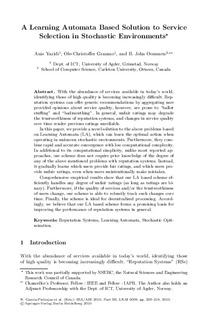| dc.contributor.author | Yazidi, Anis | |
| dc.contributor.author | Granmo, Ole-Christoffer | |
| dc.contributor.author | Oommen, B. John | |
| dc.date.accessioned | 2011-02-02T14:35:59Z | |
| dc.date.available | 2011-02-02T14:35:59Z | |
| dc.date.issued | 2010 | |
| dc.identifier.citation | Yazidi, A., Granmo, O.-C., & Oommen, B. J. (2010). A Learning Automata Based Solution to Service Selection in Stochastic Environments. In N. García-Pedrajas, F. Herrera, C. Fyfe, J. Benítez & M. Ali (Eds.), Trends in Applied Intelligent Systems (Vol. 6098, pp. 209-218): Springer Berlin / Heidelberg. | en_US |
| dc.identifier.isbn | 3-642-13032-1 | |
| dc.identifier.uri | http://hdl.handle.net/11250/137865 | |
| dc.description | Published version of a paper published in the book: Trends in Applied Intelligent Systems. Also available on SpringerLink: http://dx.doi.org/10.1007/978-3-642-13033-5_22 | en_US |
| dc.description.abstract | With the abundance of services available in today’s world, identifying those of high quality is becoming increasingly difficult. Reputation systems can offer generic recommendations by aggregating user provided opinions about service quality, however, are prone to ballot stuffing and badmouthing . In general, unfair ratings may degrade the trustworthiness of reputation systems, and changes in service quality over time render previous ratings unreliable. In this paper, we provide a novel solution to the above problems based on Learning Automata (LA), which can learn the optimal action when operating in unknown stochastic environments. Furthermore, they combine rapid and accurate convergence with low computational complexity. In additional to its computational simplicity, unlike most reported approaches, our scheme does not require prior knowledge of the degree of any of the above mentioned problems with reputation systems. Instead, it gradually learns which users provide fair ratings, and which users provide unfair ratings, even when users unintentionally make mistakes. Comprehensive empirical results show that our LA based scheme efficiently handles any degree of unfair ratings (as long as ratings are binary). Furthermore, if the quality of services and/or the trustworthiness of users change, our scheme is able to robustly track such changes over time. Finally, the scheme is ideal for decentralized processing. Accordingly, we believe that our LA based scheme forms a promising basis for improving the performance of reputation systems in general. | en_US |
| dc.language.iso | eng | en_US |
| dc.publisher | Springer | en_US |
| dc.title | A Learning Automata Based Solution to Service Selection in Stochastic Environments | en_US |
| dc.type | Chapter | en_US |
| dc.type | Peer reviewed | en_US |
| dc.subject.nsi | VDP::Mathematics and natural science: 400::Information and communication science: 420::Knowledge based systems: 425 | en_US |
| dc.subject.nsi | VDP::Technology: 500::Information and communication technology: 550 | en_US |
